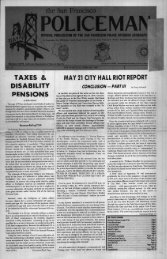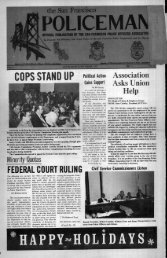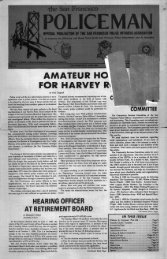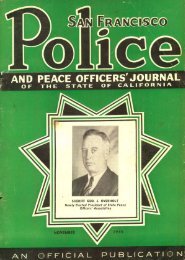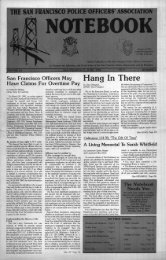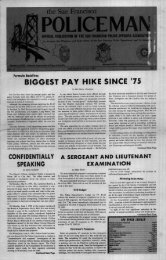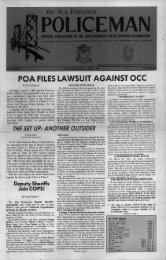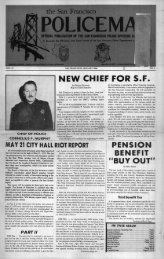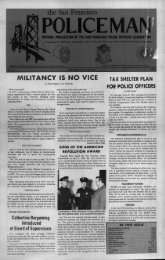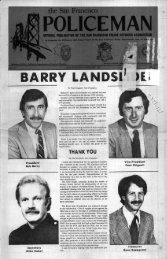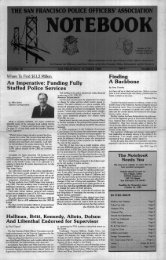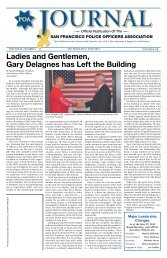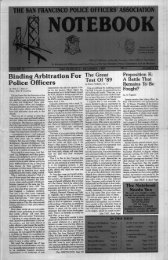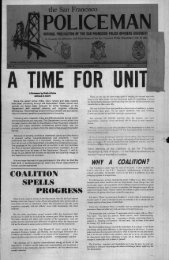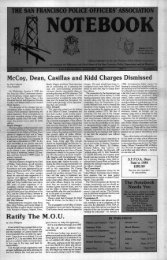August 1988 - San Francisco Police Officers Association
August 1988 - San Francisco Police Officers Association
August 1988 - San Francisco Police Officers Association
You also want an ePaper? Increase the reach of your titles
YUMPU automatically turns print PDFs into web optimized ePapers that Google loves.
<strong>August</strong>, <strong>1988</strong><br />
Notebook<br />
Page 7<br />
RETIRED<br />
MEMBERS<br />
COLUMN<br />
by Gino Marionetti & Mike Sugrue<br />
\ '<br />
/<br />
\i l\<br />
,i<br />
Movin' On<br />
Service Retirements<br />
Sgt. George Wallace<br />
Sgt. Alexander Barron<br />
Insp. Thomas Dickson<br />
Insp. David Kellogg<br />
Insp. Ben Luttringer<br />
Insp. John Minoli<br />
Insp. Dennis O'Connell<br />
Off. Budd Armstrong<br />
Off. Raymond Costello<br />
Off. Ronald Haight<br />
Off. Joseph Stone<br />
Turning Out The Light<br />
Part Two<br />
Particularly disturbing is the question of whether to<br />
withhold from a patient such life-sustaining substances<br />
as food and water. There are social, psychological and<br />
traditional aspects of these elements that make their<br />
withdrawal especially difficult.<br />
Doctors do not relish having to play God at a bedside,<br />
surrounded by a patient's usually distraught loved ones.<br />
Nor are those loved ones always united in their approach.<br />
"I saw a long-absent son come in from Cincinnati," says<br />
one doctor who practiced all his life in the South, "full<br />
of guilt for having not been a devoted son, and letting<br />
everyone know how much he really cared for his ailing<br />
mother by declaring, 'We will spare no expense to keep<br />
my mother alive,' This even though other family members<br />
who had been close to the patient knew she really did<br />
not want her life prolonged."<br />
When dealing with such situations, doctors or hospital<br />
administrators can never be sure from whom a legal action<br />
might come: from the daughter suing the doctor for<br />
prolonging her mother's agony and bankrupting the family<br />
from the son charging negligence or malpractice for<br />
letting his mother die when her life might have been<br />
prolonged<br />
There is, of course, substantial organized resistance to<br />
anything approaching a willful decision - by patient, doctor<br />
or family - to end a life. The Roman Catholic Church<br />
has been critical of right-to-die groups, seeing their agenda<br />
as too sweeping because it fails to distinguish between<br />
ordinary and extraordinary means for sustaining a dying<br />
patient.<br />
The pro-life groups have also been opposed to naturaldeath<br />
or right-to-die legislation. "So long as we hold all<br />
human life inviolate," says John C. Wilike, M.D., president<br />
of the pro-life National Right to Life Committee, "then<br />
everybody is safe. When we begin to put relative values<br />
on some lives and delegate to someone the right to take<br />
a life, no one is safe."<br />
While the sentiments concerning euthanasia or intentionally<br />
ending life are well defined, the issues of<br />
withholding or withdrawing life-prolonging treatment are<br />
less clear.<br />
But with cries of anguish coming from the heart and<br />
pocketbooks of the country, public opinion is beginning<br />
to solidify. The real issue: Do individuals have the right<br />
to make their own health-care decisions And the consensus:<br />
Yes, it's a matter of choice.<br />
Numerous court cases, TV documentaries, talk shows,<br />
movies, and endless storis in the press have echoed what<br />
Mark Rosen, M.D., of Mount Sinai Medical Center in New<br />
York said at an end-of-life seminar sponsored by the National<br />
Health Council late last year: "People who work<br />
in intensive care know there are worse things than death."<br />
After a national three-hour teleconference on "Who<br />
Lives, Who Dies, Who Decides" moderated by<br />
Nightline's Ted Koppel in 1986, questionnaires from approximately<br />
2,000 people were analyzed: Ninety percent<br />
believed adults who are competent to make decisions<br />
should have the right to refuse life-support measures even<br />
over the objections of family and physicians. Seventy percent<br />
felt that immediate family, not the courts, should<br />
make the decisions on behalf of incompetent patients.<br />
Many organizations have joined the cause, endeavoring<br />
to convince the medical profession, the courts and<br />
lawmakers that people have the right to make their own<br />
decision about when it is time to remove life supports.<br />
The Society for the Right to Die and Concern for the-<br />
Dy-ing provide counseling and guidance to individuals seeking<br />
help. The Society, for example, often helps relatives<br />
of a terminal patient see that their loved one's rights are<br />
protected and his or her wishes carried out. The Hemlock<br />
Society, based in Los Angeles, goes further: Although its<br />
literature insists that it "does not encourage suicide," it<br />
seeks to persuade society that terminally ill patients should<br />
be free "to end their lives in a planned manner."<br />
A monumental study - A Matter of Coice - done for<br />
the Special Senate Committee on Aging, and the apparently<br />
overwhelming public consensus on a subject no<br />
one wanted to think about 10 years ago, seems to be having<br />
an impact. Early this year, the Roman Catholic<br />
Diocese in Providence, Rhode Island, said it was morally<br />
permissible to remove the feeding tube from a comatose<br />
woman who had suffered a cerebral hemorrhage two<br />
years earlier. And the statement by the Reverand Robert<br />
J. McManus - apparently the first of its kind endorsed<br />
by a diocesan Church official - revealed the changing<br />
attitude toward what constitutes living and death: "Based<br />
on what the doctors have given as a prognosis, I believe<br />
this woman is dying, that the dying process began the<br />
moment she suffered the massive cerebral hemorrhage<br />
[two years ago], and all the medical treatments have only<br />
served to prolong that."<br />
Most important, the medical profession has<br />
acknowledged the ethical problems created by the tremendous<br />
improvement in life-sustaining techniques. "Until<br />
recently," says a Georgetown University law professor,<br />
"doctors thought they were competent to cover<br />
everything. Now they are aware that things they once<br />
thought medical are no longer solely medical." Some<br />
hospitals have appointed ethical advisers to help their<br />
physicians arrive at life decisions with peace of mind and<br />
some degree of certainty.<br />
Charles M. Culver, M.D., Ph.D., plays such a role at<br />
Mary Hitchcock Memorial Hospital in Hanover, New<br />
Hampshire. One colleague calls him "Captain Ethics" and<br />
at times it might appear he's playing God, but Culver<br />
doesn't see it that way: "I see myself as reporting what<br />
is relevant in moral philosophy and health law and then<br />
talking things through so the doctor sees his choices more<br />
clearly." He does not watchdog the staff, and he never<br />
intervenes; sometimes it is just a matter of a doctor stopping<br />
him in the corridor and saying, "I have an interesting<br />
case." This generally leads to conversation, with Culver<br />
giving his suggestions.<br />
Guidelines have also been issued by such institutions<br />
as the American Medical <strong>Association</strong>'s Council on Ethical<br />
and Judicial Affairs and the Hastings Center in Briarcliff<br />
Manor, New York, which specializes in medical ethics.<br />
The AMA council said that "it is not unethical to discontinue<br />
all means of life-prolonging medical treatment" for<br />
terminally ill or irreversibly comatose patients, providing<br />
the patient's family or other surrogates concur. The<br />
Hastings Center's guidelines reached similar conclusions,<br />
although there were dissenting opinions on some of the<br />
points and recommendations.<br />
Perhaps the most important point in all the recent efforts<br />
to guide doctors through this difficult territory was<br />
summed up in one of the Hastings guidelines: "When the<br />
patient has the capacity to decide about treatment, it is<br />
the patient who is the key decisionmaker.... When the<br />
patient lacks the capacity, the key decisionmaker is someone<br />
else...."<br />
In many guidelines there are references to "advance<br />
directives," and here is the real means of avoiding the kind<br />
of nightmares cited in this article. Doctors agree that every<br />
case is different; but when that difficult decision must be<br />
made, advance directives often provide critical information<br />
about the patient's wishes concerning the use of lifeprolonging<br />
technology and who the patient delegates to<br />
make those decisions.<br />
As Robert Pilpel, project coordinator for the National<br />
Health Council's bioethics program, has said, "Death is<br />
a four-letter word in our society." None of us want to think<br />
about death or even physical or mental incapacity, and<br />
this is understandable. Yet each of us, at whatever age,<br />
should give it some thought - and talk about it with our<br />
families. There are two legal tools you - and your spouse,<br />
your children, your parents, your siblings - should consider<br />
assmbling now to help ensure that what you want<br />
to happen at such a critical time will happen: the living<br />
will and the durable power of attorney.<br />
We agree with the poet Dylan Thomas that you should<br />
not go gently into that good night. But these two<br />
documents will help you, your family and your doctors<br />
at a time when what is needed most is everyone's<br />
understanding of how you feel about a critical decision<br />
that someone, sometime, may have to make for you.<br />
Reprinted from<br />
Modem Maturity, June/July <strong>1988</strong><br />
Mark Kai Co.<br />
802 Clement Street<br />
S.F. California<br />
415-751-7232<br />
RETIREMENT DINNER FOR<br />
TOM DICKSON<br />
THE EMBODIMENT<br />
OF AN INSPECTOR<br />
Wed.<br />
Aug. 31, '88<br />
Fort Mason<br />
Officer's Club<br />
$25 Per Person<br />
Couples Welcome . . -<br />
L ',<br />
No Host Cocktail<br />
7-8 PM<br />
Dinner At8<br />
Salad, Veal Oscar,<br />
Wine, Dessert<br />
FOR TICKETS<br />
M. Folena 553-9070<br />
D. Carlson 553-1550<br />
• J. Wallace 553-9073<br />
C. Peters 553-9074<br />
Retirement Dinner<br />
Tues. Aug. 30th, <strong>1988</strong><br />
ltalianAmerican Social Club<br />
25 Russia At Mission<br />
No Host Cocktails 6 PM To 7 PM<br />
Dinner At 7 PM<br />
$2700 Per Person, Includes<br />
Choice Of Entree: Roast Beef, Roast<br />
Chicken, Roast Pork, Chicken Cacciotore<br />
Or Roast Veal, Shrimp Salad, Wine, Tax<br />
Tip & Gift<br />
1)<br />
CONTACT:<br />
Dennis Costanzo, Steve Spranger,<br />
Ralph Eieig At Co. H 5531603<br />
Day Shift 0600-1600 Hrs.<br />
kt --rr<br />
UNO VEIDMAN<br />
165 Page Street<br />
S.F. California<br />
415-431-8988<br />
'U Y"<br />
' \c-..') '/1<br />
A7<br />
I



